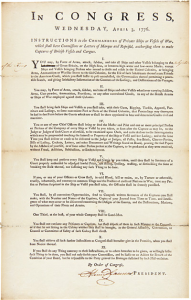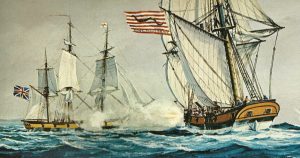 When the United States, still known as the colonies at that time, it lacked sufficient funds to build a strong navy, and with the coming Revolutionary War, they needed that strength. So, the Continental Congress gave privateers permission to attack any and all British ships. What is a privateer, you might ask? A privateer is a private person or ship that engages in maritime warfare under a commission of war.
When the United States, still known as the colonies at that time, it lacked sufficient funds to build a strong navy, and with the coming Revolutionary War, they needed that strength. So, the Continental Congress gave privateers permission to attack any and all British ships. What is a privateer, you might ask? A privateer is a private person or ship that engages in maritime warfare under a commission of war.
In a bill signed by John Hancock, president of the Continental Congress, and dated April 3, 1776, the Continental Congress issued, “INSTRUCTIONS to the COMMANDERS of Private Ships or vessels of War, which shall have Commissions of Letters of Marque and Reprisal, authorizing them to make Captures of British Vessels and Cargoes.” Letters of Marque and Reprisal were the official documents by which 18th century governments commissioned private commercial ships, known as privateers, to act on their behalf, attacking ships carrying the flags of enemy nations. As a perk, any goods captured by the privateer were divided between the ship’s owner and the government that had issued the letter.
Congress informed American privateers on this day that, “YOU may, by Force of Arms, attack, subdue, and take all Ships and other Vessels belonging to the Inhabitants of Great Britain, on the high seas, or between high-water and low-water Marks, except Ships and Vessels bringing Persons who intend to settle and reside in the United Colonies, or bringing Arms, Ammunition or Warlike Stores to the said Colonies, for the Use of such Inhabitants thereof as are Friends to the American Cause, which you shall suffer to pass unmolested, the Commanders thereof permitting a peaceable Search, and giving satisfactory Information of the Contents of the Ladings, and Destinations of the Voyages.” In many ways, this action was very similar to guerrilla warfare, except it was a battle fought on the high seas, and unlike guerrillas, these men were acting under the authority of the government…even if both were fighting for their nation.
For those who faced them on the high seas, there was no difference between pirates and privateers. They  acted and operated identically, boarding and capturing ships using force, if necessary. However, privateers holding Letters of Marque were not subject to prosecution by their home nation and, if captured, were treated as prisoners of war instead of criminals by foreign nations. I wonder if their were actually pirates among he privateers. To me, it would make sense to believe that their were, but perhaps the government would not authorize known pirates to do this work. Either way, the privateer commission was a very successful form of warfare in the Revolutionary War days.
acted and operated identically, boarding and capturing ships using force, if necessary. However, privateers holding Letters of Marque were not subject to prosecution by their home nation and, if captured, were treated as prisoners of war instead of criminals by foreign nations. I wonder if their were actually pirates among he privateers. To me, it would make sense to believe that their were, but perhaps the government would not authorize known pirates to do this work. Either way, the privateer commission was a very successful form of warfare in the Revolutionary War days.


Leave a Reply